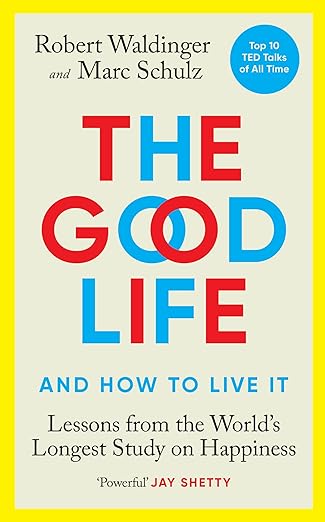TED Talk video at the bottom of this page
– Over 80 percent said that a major life goal for them was to get rich and another 50 percent of those same young adults said that another major life goal was to become famous.
– For 75 years the lives of 724 men were tracked, asking about their work, their home lives, their health, and of course asking all along the way without knowing how their life stories were going to turn out.
– About 60 of the original 724 men are still alive, still participating in the study, most of them in their 90s. And we are now beginning to study the more than 2,000 children of these men.
Amazon #ads

– Since 1938 the lives of two groups of men were tracked. The first group started in the study when they were sophomores at Harvard College. They all finished college during World War II, and then most went off to serve in the war. And the second group that we’ve followed was a group of boys from Boston’s poorest neighborhoods, boys who were chosen for the study specifically because they were from some of the most troubled and disadvantaged families in the Boston of the 1930s. Most lived in tenements, many without hot and cold running water.
– Every two years, patient and dedicated research staff call the men and asks them if one more set of questions about their lives can be sent to them.
– They are interviewed in their living rooms. Medical records from their doctors are acquired. Drawing blood, brain scans, talks with their children, video taping them talking with loved ones about their deepest concerns. About a decade ago, the wives were asked if they would like to be interviewed, many of the women said, “You know, it’s about time.”
– The lessons aren’t about wealth or fame or working harder and harder. The clearest message is this: Good relationships keep us happier and healthier. Period.
– 3 big lessons about relationships. The first is that social connections are really good for us, and that loneliness kills. It turns out that people who are more socially connected to family, to friends, to community, are happier, they’re physically healthier, and they live longer than people who are less well connected. And the experience of loneliness turns out to be toxic. People who are more isolated than they want to be from others find that they are less happy, their health declines earlier in midlife, their brain functioning declines sooner and they live shorter lives than people who are not lonely. You can be lonely in a crowd and you can be lonely in a marriage, so the second big lesson that we learned is that it’s not just the number of friends you have, and it’s not whether or not you’re in a committed relationship, but it’s the quality of your close relationships that matters. It turns out that living in the midst of conflict is really bad for our health. High-conflict marriages, for example, without much affection, turn out to be very bad for our health, perhaps worse than getting divorced. And living in the midst of good, warm relationships is protective. Following the men all the way into their 80s to see if we could predict who was going to grow into a happy, healthy octogenarian and who wasn’t. It was how satisfied they were in their relationships that predicted how they were going to grow old. The people who were the most satisfied in their relationships at age 50 were the healthiest at age 80. And good, close relationships seem to buffer us from some of the slings and arrows of getting old. The most happily partnered men and women reported, in their 80s, that on the days when they had more physical pain, their mood stayed just as happy. But the people who were in unhappy relationships, on the days when they reported more physical pain, it was magnified by more emotional pain. And the third big lesson that we learned about relationships and our health is that good relationships don’t just protect our bodies, they protect our brains. It turns out that being in a securely attached relationship to another person in your 80s is protective, that the people who are in relationships where they really feel they can count on the other person in times of need, those people’s memories stay sharper longer. And the people in relationships where they feel they really can’t count on the other one, those are the people who experience earlier memory decline. And those good relationships, they don’t have to be smooth all the time. Some of our octogenarian couples could bicker with each other day in and day out, but as long as they felt that they could really count on the other when the going got tough, those arguments didn’t take a toll on their memories.
– The people who were the happiest in retirement were the people who had actively worked to replace workmates with new playmates. Just like the millennials in that recent survey, many of the men when they were starting out as young adults really believed that fame and wealth and high achievement were what they needed to go after to have a good life. But over and over, over these 75 years, the study has shown that the people who fared the best were the people who leaned in to relationships, with family, with friends, with community.
– Solutions for you right now are endless. It might be something as simple as replacing screen time with people time or livening up a stale relationship by doing something new together, long walks or date nights, or reaching out to that family member who you haven’t spoken to in years, because those all-too-common family feuds take a terrible toll on the people who hold the grudges.
What makes a good life? Lessons from the longest study on happiness | Robert Waldinger




